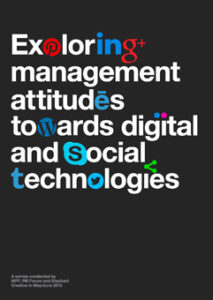Digital: All about relationships
The Digital & Social Technologies Study 2013, conducted by Managing Partners’ Forum, PM Forum and Elephant Creative, uncovered some interesting insights. Helen Hammond summarises the findings.
 The inaugural survey, completed by 190 inhouse professionals within management and marketing, and available in full later this month, explored three crucial aspects:
The inaugural survey, completed by 190 inhouse professionals within management and marketing, and available in full later this month, explored three crucial aspects:
1 Digital in context
Putting digital in context with other communication channels:
- Over 90% use the tools to collaborate with others during working hours – 30% for half or more of the time. 40% for more than two years.
- Most prefer articles, discussions with co-workers and trial & error to formal training.
- Digital experts view using the phone or emails with clients or social media for work purposes of equal relevance. By contrast, digital novices gave a significantly lower ranking to social media.
- There is significant confusion over the impact on relationships, whether digital technologies could contribute to this and whether clients needed face-to-face interaction.
- The perceived value of face-to-face time is changing – whilst it is universally seen as the most important communication channel, there was considerable confusion over the impact that digital technologies have on the value of meetings with 93% believing that they waste time in them. Many felt that digital technologies could be used to improve this.
2 Relevance & usage of digital and social technologies
The extent to which specific digital channels are used now and in the future, and are seen as relevant to awareness and knowledge, relationships and interactions, and gaining new client instructions:
- The primary usage of these channels is marketing to prospects with building brand/image and attracting new clients being the key areas of focus – effectively advertising. Twitter is viewed as the top channel for marketing and knowledge sharing, with strong growth also anticipated for YouTube, Facebook and Google+.
- Although 84% use one or more digital and social channel for marketing, there is no consensus over whether they are seen as an essential precondition of marketing a firm.
- LinkedIn, the most popular channel for interaction, is not expected to be an area for growth in the next year.
- Digital experts are winning the argument on client interactions but not on using these tools for internal conversations.
- Respondents are predicting limited changes from current usage levels in these tools despite the world being characterised by disruptive change.
3 Evaluation & outcomes (ROI)
The extent to which firms are currently evaluating the level of investment relative to preferred outcomes, collecting tracking data, and sharing it with those needing to know:
- While the standard metric for advertising campaigns is changes in awareness not new work gained, obtaining new instructions from clients is perceived to be the most highly valued outcome. This is a critical mismatch, supported by the volume of relevant instructions being low, with 50% reporting fewer than five new clients, and 46% reporting fewer than five new instructions from existing clients.
- Client care and helping the firm to achieve its business objectives are seen as the least valuable outcomes, with engagement occupying the middle ground.
- Although cash investment is a misleading metric for a timebased activity, 18% of management intends to increase the budget for digital technologies by over 10%, yet only 7% of marketing expect such an increase.
- 85% of firms collect tracking data against KPIs, yet there is a noticeable lack of sharing of relevant data with MPs and practice leaders despite their critical role in business and practice development. This reflects the belief that the primary purpose of these tools is awareness, rather than engagement and collaboration with clients, as part of an extended process to generate new work.
- Another danger is that clients may gain the impression of a firm not being cost-conscious through excessive time wasting on social media.
Wider issues:
- The impact on a firm as its digital novices become experts. Should this be sped up through effective interventions?
- Ensuring the disruptive impact of emerging technologies is considered in business strategy discussions.
- Facilitating a culture of collaboration with resulting productivity and business growth.
- Setting personal goals – in particular the role the tools could play in performance assessment.
Survey demographics: 190 in-house; 82% UK-based. Equal numbers of management team and marketing experts. 24% digital experts; 64% working knowledge; 15% novices. Firm footprint: 47% global; 15% capital city; 16% national; 22% regional. Sector: 46% law; 21% accountancy; 16% consultancy; 9% property.
Helen Hammond, Elephant Creative Solutions. Twitter: @helenhammond
Download the full report

